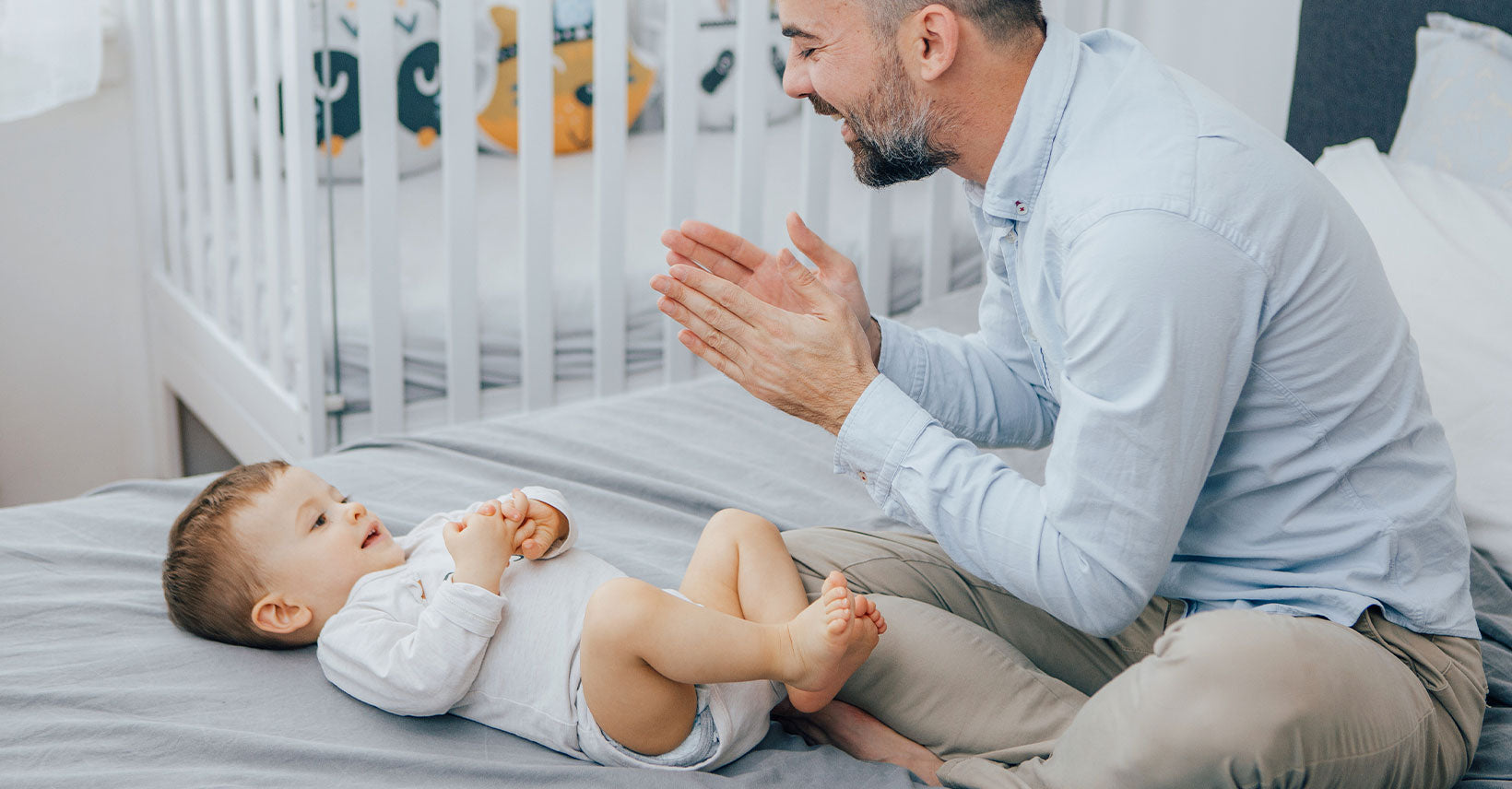


Babies usually start clapping when they are about 9 months old. This is an interesting milestone of babies and shows that their hand coordination and social awareness are developing better.
When babies clap, they are usually imitating adults or expressing excitement. Each baby has his/her own rate of development, so some babies may clap earlier or later, which is normal. Parents can encourage their babies to clap their hands through interactive games such as “Pat-a-Cake”.
Clapping is a sign that your baby's motor skills are improving. This involves coordinating hand movements in a way that requires better control of babies' small muscles. When babies learn to clap their hands, it reflects increasing strength and coordination in their hands and fingers, which will help them master other skills such as grasping objects or eventually holding a spoon.
Clapping can indicate that your baby's social awareness is growing. Babies will often clap their hands in response to excitement or encouragement from others, which means they are beginning to recognize and respond to social cues.
Clapping is one of the first ways babies express their emotions and participate in group activities, setting the foundation for more complex forms of socialization.
Clapping helps with cognitive development because it teaches babies about cause and effect. When they notice that clapping draws attention or makes a sound, they begin to understand that their actions have consequences. This early understanding of cause and effect is important for learning more complex problem-solving and decision-making skills later in life.
When babies clap their hands, they are usually trying to communicate or participate in a shared experience. This interaction helps your baby's language development because it encourages them to listen and respond to the words, tone, and expressions of others. Over time, babies may begin to clap to the rhythm of a song or mimic the sound of clapping, associating movement with sound and language.
For babies, mastering clapping is a small but important accomplishment. Confidence is built when they clap and see positive reactions from their parents or others. This sense of accomplishment helps motivate babies to keep trying new things, which is essential to their overall development.
Babies usually start clapping when they are about 9 months old, but the exact time may vary. Clapping is a sign that your baby is developing hand coordination and motor skills. Some babies may clap earlier, while others may take longer, and both are normal. Parents usually notice their babies clapping when they are excited or imitating others. This is one of the early milestones that show that your baby is growing both physically and socially.
One of the easiest ways to encourage your baby to clap is to demonstrate. Parents can clap at playtime, during a song, or when their baby is doing something exciting. Babies often imitate what they see, so modeling clapping usually will give them a clear example. The more they see, the more likely they are to try it themselves.
Games like “Pat the Cake” are great for encouraging your baby to clap because they involve repetitive hand movements that your baby can imitate. These games make clapping fun and interactive, keeping the baby engaged while reinforcing the movement. Parents can gently guide their baby's clapping during the game to help them get used to the movement.
Singing simple songs with clapping rhythms can encourage babies to clap along. Parents can start by clapping during the song and then pause to give the baby a chance to try it out. Over time, the baby may begin to anticipate the clapping part of the song and join in, learning to match his or her movements to the rhythm.
Giving encouragement when your baby tries to clap, even if it's not perfect, can motivate them to keep practicing. Smiling, cheering, or clapping when your baby tries to clap lets them know that their efforts are noticed and appreciated. This positive reinforcement helps build confidence and encourages them to keep trying.
Parents can introduce clapping into everyday activities such as mealtimes or bath time. For example, clapping after babies have eaten or played with toys creates an opportunity for them to practice in a familiar environment. By making clapping a part of daily activities, babies may become more comfortable with the action and be more willing to clap on their own.
In summary, infants typically begin clapping at about 9 months of age, but each infant is different and some may reach this milestone earlier or later. Clapping is a sign of developing motor skills, social awareness, and cognitive abilities. Parents can encourage their babies to clap by modeling the clapping behavior, playing interactive games, and providing positive reinforcement. While clapping is a fun and exciting milestone, it is important to remember that babies develop at their own pace and each step in their growth is unique.

Lily Hou
An expert in sleep sack design, is a valued contributor to Kaiya Baby's blog. With a strong background in baby sleep bags and maternal care, she is highly regarded for her professionalism. Lily prioritizes baby comfort and safety in her designs, using high-quality materials. Her insightful articles on sleep bags have been featured in reputable publications and have gained a significant readership. Trust Lily to help you create a comfortable and safe sleep environment for your baby, backed by her proven track record in the industry.
Leave a comment
This site is protected by hCaptcha and the hCaptcha Privacy Policy and Terms of Service apply.